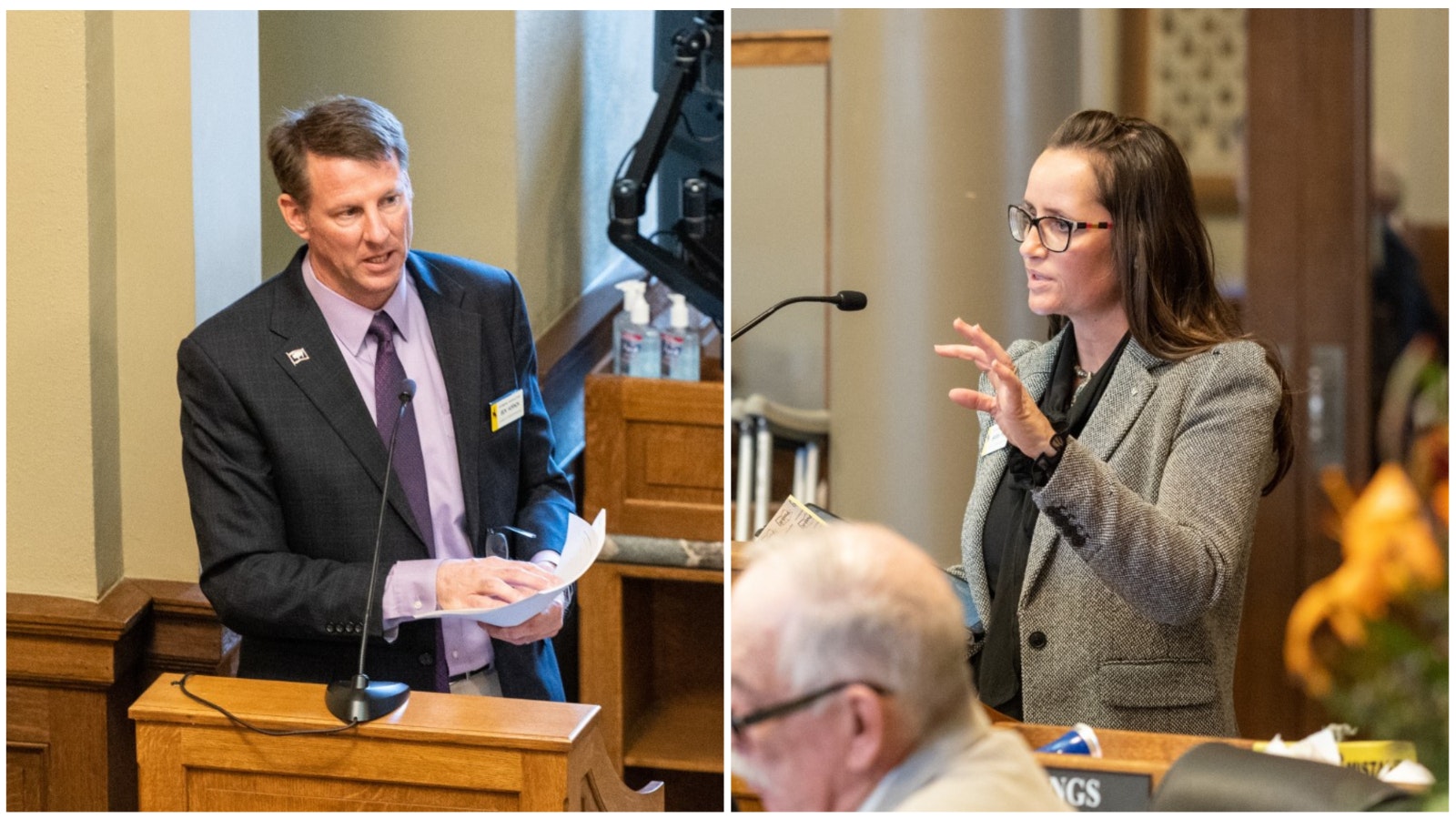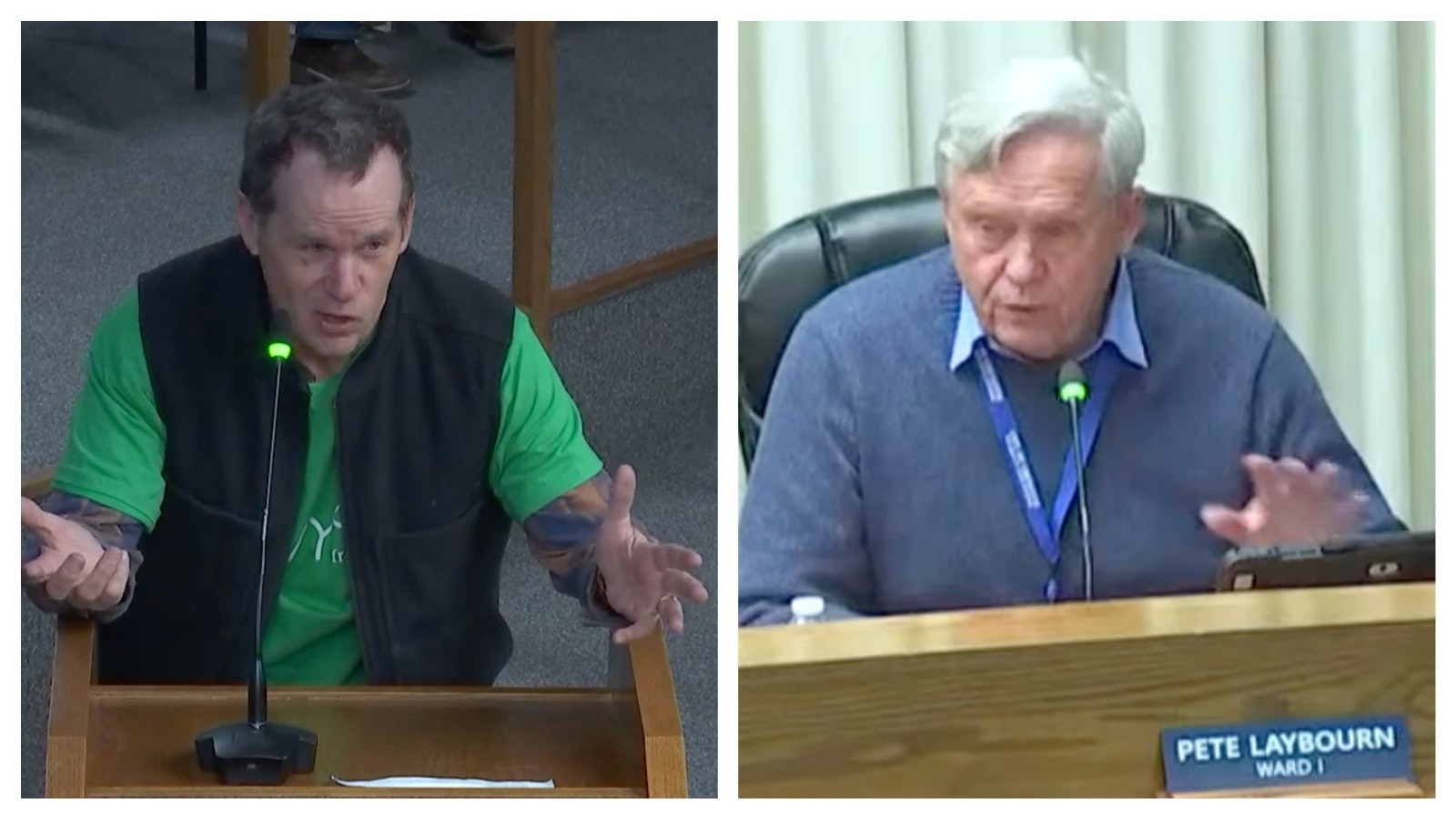By Clair McFarland, General Assignment Reporter
Clair@CowboyStateDaily.com
Though one Wyoming House representative attempted a last-minute rally against it, the House on Wednesday passed a proposed law designed to keep American Indian children out of non-native foster and adoptive homes.
Rep. Ben Hornok, R-Cheyenne, opened Senate File 94 for one last debate during the bill’s third reading. The bill is a copy of the federal Indian Child Welfare Act (ICWA), which is currently law but is being challenged in the U.S. Supreme Court on multiple constitutional issues.
Senate File 94 would codify a state version of the federal law in case the high court overturns the federal act as an overreach of Congress. It has passed the state House and Senate and is very likely to become state law in the coming days, since Gov. Mark Gordon supports it.
The bill’s proponents said it’s necessary to preserve American Indian tribes’ sovereignty and keep foster and adoptive children with their cultural group. Bill opponents said the bill does not ask courts to consider children’s best interests at all, and favors a political class or a race of people over individual children’s case-by-case needs.
“We all agree we need to do the right thing for the kids,” said Hornok. “How we get there is what we’re debating. We’ve had kids join us today. And I want you to keep those kids in mind.”
Group Home Before Non-Native Home
Rep. Ken Pendergraft, R-Sheridan, also spoke against SF 94. He pointed to a portion of the bill requiring courts to keep native children out of non-native foster or adoptive homes if any native homes or orphanages are available.
The law prioritizes that courts place native children with family members, fellow tribal members, members of any other Indian tribe or in a tribal group home – before sending them to live with any non-native family.
“I am inclined to resist any bill that gives any preference to any race on any subject at any time,” said Pendergraft.
He said he agreed with sending children to live with family members or with fellow tribal members. But the requirement to send children to a different tribe or put them in a group home before letting them stay with a non-native family gave him “heartburn,” he said.
“It may indeed be that down the road, there’s a case where… other placement would be preferable to all those involved, and this law would stand in the way,” said Pendergraft. “And I don’t think that’s appropriate.”
‘Not About Race’
Rep. Landon Brown, R-Cheyenne, said Pendergraft and other bill opponents are wrong in thinking of the law as racially discriminatory.
“I’ve heard it two or three times that this is regarding race,” said Brown. “These are sovereign tribes… It’s not about race.”
The Supreme Court has not yet decided whether the law is racially discriminatory. The federal government is arguing that the law isn’t racist and treats American Indian tribes as lesser sovereigns under Congress.
Multiple foster families challenging the law, however, are arguing that the law discriminates against the very children it seeks to protect by making it harder for American Indian children to be adopted when their biological parents are unfit to care for them.
The law only allows courts to terminate parental rights if it’s proven “beyond a reasonable doubt” that the Indian child’s parents will cause serious emotional or physical damage to that child if they regain custody.
That’s a higher standard for termination than non-native children face when courts consider removing parental rights from their parents.
‘Checkered Past’
House Speaker Rep. Albert Sommers, R-Pinedale, argued in favor of SF 94, saying that non-native people have a “checkered past” with the tribes and owe it to them to support their sovereignty and culture now.
The bill’s sponsor Rep. Lloyd Larsen, R-Lander, also spoke of the harsh assimilation policies to which federal and state governments subjected Indian children before the federal act passed in 1978. Numerous Indian children were sent to boarding schools and disciplined for speaking their native languages. Many were also abused in those boarding schools.
Larsen said Wyoming needs to codify the federal law to prevent assimilative tendencies from creeping back into government.
“We need to be careful then that we’re not trying to take away the ability of these tribes to act within what they perceive as a sovereign right,” said Larsen. “We’re trying to exercise caution that we don’t let the pendulum swing back too far.”
Task Force
The Legislature earlier this session passed another ICWA law establishing a taskforce of experts to determine what an ideal state version of the federal law would look like.
Hornok said that because Wyoming already enacted the taskforce law, it would be premature to enact SF 94. He said it would be better to let the taskforce find the best version of the Indian Child Welfare Act.
“What the taskforce needs to do is tailor (the law) to Wyoming,” he said. “To the reservation we have, to the tribes we have in Wyoming.”
Larsen countered, saying SF 94 is necessary now, to preserve all tribes’ sovereignty and retention of their children while the state waits on the Supreme Court to rule.
Rep. Sarah Penn, R-Lander, whose voter district is on the Wind River Indian Reservation, also supported SF 94, saying it will “maintain the status quo until we can figure out where the state really wants to take this.”
‘Vote Your Conscience, Please’
Hornok told his House colleagues that SF 94 is a matter of conscience, not politics.
“All of the kids we’re talking about in this bill, none of them are going to vote for any of us. It’s not about whether we’re going to win a vote. This is about what’s proper and right for the kids,” said Hornok. “Vote your conscience, please. It will make a difference in the lives of a child or two on this.”
The House earlier this week altered SF 94 so it will expire in 2027, though future Legislatures can repeal that sunset date if they choose to.
Roll Call
House delegates who voted in favor of SF 94 are the following:
Rep. Lane Allred, R-Afton
Rep. Ryan Berger, R-Evanston,
Rep. Landon Brown, R-Cheyenne
Rep. Donald Burkhart Jr, R-Rawlins
Rep. Forrest Chadwick, R-Evansville
Rep. Ken Chestek, D-Laramie
Rep. Ken Clousten, R-Gillette
Rep. Jon Conrad, R-Mountain View
Rep. Barry Crago, R-Buffalo
Rep. Bob Davis, R-Baggs
Rep. Jon Eklund, R-Cheyenne
Rep. Steve Harshman, R-Casper
Rep. Scott Heiner, R-Green River
Rep. Bill Henderson, R-Cheyenne
Rep. Lloyd Larsen, R-Lander
Rep. JT Larson, R-Rock Springs
Rep. Martha Lawley, R-Worland
Rep. Sandy Newsome, R-Cody
Rep. Bob Nicholas, R-Cheyenne
Rep. Tony Niemiec, R-Green River
Rep. David Northrup, R-Powell
Rep. Ember Oakley, R-Riverton
Rep. Kevin O’Hearn, R-Mills
Rep. Jared Olsen, R-Cheyenne
Rep. Pepper Ottman, R-Riverton
Rep. Sarah Penn, R-Lander
Rep. Karlee Provenza, D-Laramie
Rep. Trey Sherwood, D-Laramie
Rep. Daniel Singh, R-Cheyenne
Rep. Liz Storer, D-Jackson
Rep. Tamara Trujillo, R-Cheyenne
Rep. Tom Walters, R-Casper
Rep. Cyrus Western, R-Big Horn
Rep. John Winter, R-Thermopolis,
Rep. Cody Wylie, R-Rock Springs
Rep. Mike Yin, D-Jackson
Rep. Dan Zwonitzer, R-Cheyenne
Rep. Dave Zwonitzer, R-Cheyenne
House Speaker Rep. Albert Sommers, R-Pinedale
House delegates who voted against SF 94 are the following:
Rep. Ocean Andrew, R-Cheyenne
Rep. Abby Angelos, R-Gillette
Rep. Dalton Banks, R-Cowley
Rep. John Bear, R-Gillette
Rep. Jeremy Haroldson, R-Wheatland
Rep. Ben Hornok, R-Cheyenne
Rep. Mark Jennings, R-Sheridan
Rep. Christopher Knapp, R-Gillette
Rep. Tony Locke, R-Casper
Majority Floor Leader Rep. Chip Neiman, R-Hulett
Rep. Jerry Obermuller, R-Casper
Rep. Ken Pendergraft, R-Sheridan
Rep. Rachel Rodriguez-Williams, R-Cody
Rep. Allen Slagle, R-Newcastle
Rep. Scott Smith, R-Lingle
Rep. Clark Stith, R-Rock Springs
Rep. Tomi Strock, R-Douglas
Rep. Clarence Styvar, R-Cheyenne
Rep. Reuben Tarver, R-Gillette
Rep. Jeanette Ward, R-Casper
Rep. Art Washut, R-Casper
Reps. Bill Allemand, R-Midwest, and Andrew Byron, R-Jackson, were not present for the vote.





